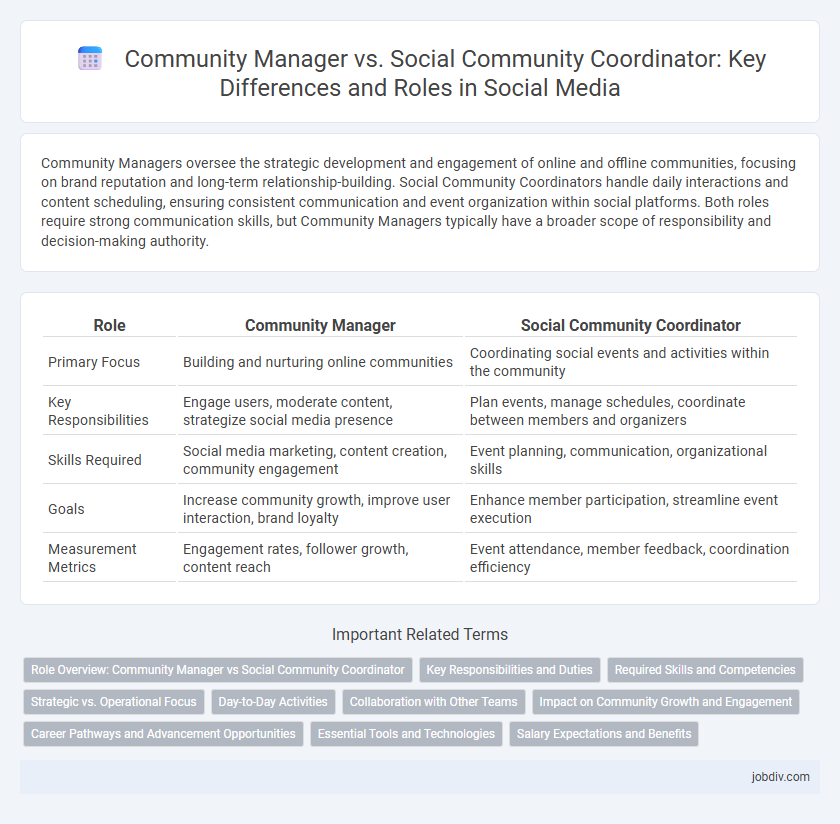Community Managers oversee the strategic development and engagement of online and offline communities, focusing on brand reputation and long-term relationship-building. Social Community Coordinators handle daily interactions and content scheduling, ensuring consistent communication and event organization within social platforms. Both roles require strong communication skills, but Community Managers typically have a broader scope of responsibility and decision-making authority.
Table of Comparison
| Role | Community Manager | Social Community Coordinator |
|---|---|---|
| Primary Focus | Building and nurturing online communities | Coordinating social events and activities within the community |
| Key Responsibilities | Engage users, moderate content, strategize social media presence | Plan events, manage schedules, coordinate between members and organizers |
| Skills Required | Social media marketing, content creation, community engagement | Event planning, communication, organizational skills |
| Goals | Increase community growth, improve user interaction, brand loyalty | Enhance member participation, streamline event execution |
| Measurement Metrics | Engagement rates, follower growth, content reach | Event attendance, member feedback, coordination efficiency |
Role Overview: Community Manager vs Social Community Coordinator
A Community Manager oversees the overall online presence and engagement strategy, ensuring brand consistency across social platforms while fostering meaningful interactions with the audience. In contrast, a Social Community Coordinator focuses on executing day-to-day social media activities, including content scheduling, monitoring conversations, and supporting community growth efforts. Both roles prioritize audience engagement but differ in strategic versus operational responsibilities within social community management.
Key Responsibilities and Duties
Community Managers oversee strategic planning, content creation, and overall community engagement to build brand loyalty and manage online reputation. Social Community Coordinators focus on executing daily communication, moderating interactions, organizing events, and supporting community initiatives to maintain active participation and user satisfaction. Both roles require strong interpersonal skills, but Managers emphasize leadership and analytics, while Coordinators handle operational and tactical tasks.
Required Skills and Competencies
Community Managers must excel in strategic communication, content creation, and conflict resolution to build and maintain vibrant online communities, while Social Community Coordinators require strong organizational skills, event planning expertise, and proficiency in scheduling social media activities. Both roles demand excellent interpersonal abilities, but Community Managers often focus on long-term engagement strategies whereas Coordinators emphasize tactical execution and logistical support. Proficiency in analytics tools, social media platforms, and customer relationship management software is essential across both positions for effective performance.
Strategic vs. Operational Focus
A Community Manager drives strategic initiatives by developing long-term engagement plans and aligning community goals with broader business objectives. In contrast, a Social Community Coordinator handles operational tasks such as moderating discussions, scheduling content, and managing daily interactions to maintain active participation. The strategic focus of a Community Manager shapes community growth and brand loyalty, while the Coordinator ensures seamless execution of ongoing social activities.
Day-to-Day Activities
Community Managers oversee overall community engagement by creating content, managing social media channels, and responding to member inquiries to foster brand loyalty. Social Community Coordinators focus more on executing specific campaigns, organizing events, and monitoring community feedback for reporting purposes. Both roles require strong communication skills but differ in strategic responsibility and hands-on task management.
Collaboration with Other Teams
A Community Manager strategically leads online engagement by aligning marketing, PR, and customer support teams to create cohesive campaigns and resolve user issues efficiently. A Social Community Coordinator focuses on day-to-day interactions and content scheduling, ensuring consistent communication and feedback flow between community members and internal teams like product development and customer service. Both roles require strong cross-functional collaboration to enhance brand presence and foster a vibrant, responsive social community.
Impact on Community Growth and Engagement
A Community Manager drives community growth and engagement by creating strategic content, moderating interactions, and fostering a sense of belonging, resulting in increased user retention and activity. A Social Community Coordinator focuses on executing tactical campaigns and managing daily social interactions to support community initiatives and boost real-time engagement metrics. The combined efforts of both roles significantly enhance community vibrancy, user loyalty, and overall platform reach.
Career Pathways and Advancement Opportunities
Community Managers typically oversee strategy, engagement, and content across social platforms, positioning them for leadership roles such as Social Media Director or Digital Marketing Manager. Social Community Coordinators often handle day-to-day community interactions and support tasks, providing a foundational experience that can lead to advanced roles like Community Manager or Event Coordinator. Both career pathways offer growth opportunities but differ in scope, with Community Managers focusing on broader strategy and Social Coordinators emphasizing operational execution.
Essential Tools and Technologies
Community Managers leverage platforms like Hootsuite, Sprout Social, and Google Analytics to monitor engagement and analyze social metrics, ensuring strategic growth and brand consistency. Social Community Coordinators utilize collaboration tools such as Slack, Trello, and ContentCal to facilitate content scheduling, team coordination, and real-time communication. Both roles benefit from CRM systems like Salesforce and customer support platforms like Zendesk to enhance member interaction and streamline community management processes.
Salary Expectations and Benefits
Community Managers typically earn higher salaries than Social Community Coordinators due to their strategic responsibilities in overseeing brand presence and engagement across platforms. Social Community Coordinators often receive benefits focused on operational support roles, such as training and development opportunities, while Community Managers gain enhanced compensation packages including performance bonuses and health benefits. Salary expectations for Community Managers range from $60,000 to $85,000 annually, whereas Social Community Coordinators usually earn between $40,000 and $55,000, reflecting the difference in scope and accountability.
Community Manager vs Social Community Coordinator Infographic

 jobdiv.com
jobdiv.com